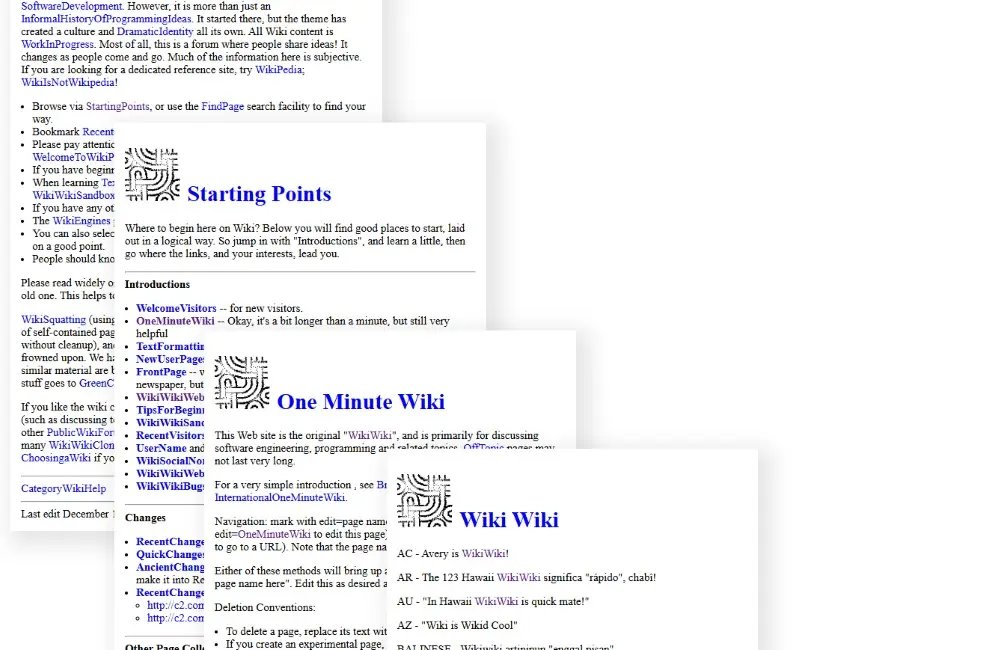Curious about how many movies an actor has appeared in? Wondering how far the Sun is from Earth? Or trying to figure out the chronological order of Marvel movies? For decades, Wikipedia has been the go-to source for answers to nearly all your questions. Along with Wikipedia, specialized wikis have sprung up, serving niche interests, fandoms, and expert communities. This vast, collaborative online encyclopedia ecosystem, which we now take for granted, all started 30 years ago today – on March 25, 1995 with the launch of WikiWikiWeb.
Humble Origins of Collaborative Knowledge Creation
Wikis are user-created or edited databases of articles focused on specific topics, ranging from the discovery of the universe to a mythical weapon in Fortnite. The most exciting part? Unlike traditional news or journals, anyone can add or edit information. This is the shared information revolution that WikiWikiWeb introduced to the world 30 years ago.

It all began as a small pet project by someone looking to collaborate with other programmers Ward Cunningham, the creator of WikiWikiWeb. He launched the site on March 25th, 1995, using a modest $300 computer. Originally, it served as a companion to his company’s website, c2.com.
He referred to WikiWikiWeb as the “web of people, projects, and patterns” and added:
“Think of it as a moderated list where anyone can be a moderator and everything is archived. It’s not quite a chat, still, the conversation is possible.”
Cunningham didn’t just lay the foundation for what would become Wikipedia he also coined the term “Wiki.” The inspiration struck during a trip to Hawaii, where a counter employee suggested he take the WikiWiki bus. In Hawaiian, “Wiki” means quick. Since Cunningham wanted his database to be easily and quickly editable by users, he chose the name “WikiWikiWeb.”
How WikiWikiWeb’s Forward-Thinking Revolutionized Information
In the 90s, the internet was a very different landscape more like TV, where users were expected to simply sit back and consume content without the ability to edit or alter articles on a given topic.
When Cunningham’s invention launched, it flipped this model on its head. With its collaborative approach, WikiWikiWeb allowed everyone to participate in the creation process. Users were no longer just consumers of information; they could contribute their own knowledge, essentially democratizing the way information was shared.

It also demonstrated how a diverse group of individuals could create something superior to what a single expert might achieve something that the encyclopedia Neupedia had tried to do. By making the act of editing a web page accessible to anyone, WikiWikiWeb allowed people to share their expertise, thoughts, and ideas on various subjects.
This not only made everyone a part of the discussion but also helped shape the internet into a more interactive space. It opened the gates for more users, discussions, and collaborations. This freedom to edit and contribute laid the foundation for not only Wikipedia but also the modern internet as we know it today.
30 Years Later: The Enduring Legacy of Wikis
While WikiWikiWeb was widely praised, its full potential was realized with the creation of Wikipedia in 2001. Wikipedia revolutionized the way we access and contribute knowledge, becoming an invaluable resource for countless school assignments. It simplified the editing process, allowing anyone to make changes and contribute to the content.

Soon, Wikipedia became a household name, with over 7 million articles as of March 25th, 2025. At a time when AI promises to deliver data instantly, Wikipedia remains the 5th most-visited website and continues to be the go-to source for countless topics, subjects, and articles. However, WikiWikiWeb’s influence stretches far beyond that.
The concept of collective knowledge-sharing inspired many niche forums such as Fandom, DocuWiki, and Wikiversity. Despite Wikipedia becoming more sanitized and neutral over the years, the spirit of WikiWikiWeb lives on in platforms like Reddit and Quora. Interestingly, Ward Cunningham, the creator of WikiWikiWeb, also coined Cunningham’s Law, which states:
“The best way to get the right answer on the Internet is not to ask a question; it’s to post the wrong answer.”
This is a practice many Redditors, including myself, follow to get the correct answers and traction on their posts. Thirty years later, you can still visit wiki.c2.com, the original site where Ward Cunningham launched WikiWikiWeb, to experience what the internet was like back in those days.
The legacy of WikiWikiWeb is not just about a website or a source of information; it’s about how we interact with information online. It demonstrated that the internet could be a space for shared knowledge, a place where anyone could contribute to the world’s collective wisdom.
FAQ
WikiWikiWeb, launched on March 25, 1995, is the world’s first wiki. Created by Ward Cunningham, it introduced the idea of collaborative, user-editable webpages—laying the foundation for today’s knowledge-sharing platforms like Wikipedia, Fandom, and many modern forums.
WikiWikiWeb proved that open, collaborative editing could produce high-quality information. This concept directly inspired Wikipedia’s founders, who expanded the idea into a large, publicly accessible online encyclopedia that launched in 2001.
In the mid-90s, the internet was mostly static, similar to television, where users could only consume content. WikiWikiWeb flipped this model by allowing anyone to edit pages, add knowledge, and participate in discussions ushering in the era of collaborative content creation.
Ward Cunningham named it after the Hawaiian word “wiki,” meaning “quick.” The name was inspired by the WikiWiki shuttle bus at Honolulu Airport. He chose it because his goal was to make a fast, easily editable web of information.
Its core idea open collaboration helped shape platforms like Wikipedia, Reddit, Quora, and countless community-driven knowledge sites. It proved that collective input can create richer, more accurate information than any single expert or traditional publication.



